- Home
- Roald Dahl
Someone Like You
Someone Like You Read online
ROALD DAHL
Someone Like You
With a Foreword by Dom Joly
PENGUIN BOOKS
Contents
Taste
Lamb to the Slaughter
Man from the South
The Soldier
My Lady Love, My Dove
Dip in the Pool
Galloping Foxley
Skin
Poison
The Wish
Neck
The Sound Machine
Nunc Dimittis
The Great Automatic Grammatizator
Claud’s Dog
The Ratcatcher
Rummins
Mr Hoddy
Mr Feasey
PENGUIN MODERN CLASSICS
Someone Like You
Roald Dahl’s parents were Norwegian, but he was born in Llandaff, Glamorgan, in 1916 and educated at Repton School. On the outbreak of the Second World War, he enlisted in the RAF at Nairobi. He was severely wounded after joining a fighter squadron in Libya, but later saw service as a fighter pilot in Greece and Syria. In 1942 he went to Washington as Assistant Air Attaché, which was where he started to write, and was then transferred to Intelligence, ending the war as a wing commander. His first twelve short stories, based on his wartime experiences, were originally published in leading American magazines and afterwards as a book, Over to You. All of his highly acclaimed stories have been widely translated and have become bestsellers all over the world. Anglia Television dramatized a selection of his short stories under the title Tales of the Unexpected. Among his other publications are two volumes of autobiography, Boy and Going Solo, his much-praised novel My Uncle Oswald, and Roald Dahl’s Book of Ghost Stories, of which he was editor. During the last year of his life he compiled a book of anecdotes and recipes with his wife, Felicity, which was published by Penguin in 1996 as Roald Dahl’s Cookbook. He is one of the most successful and well known of all children’s writers, and his books are read by children all over the world. These include James and the Giant Peach, Charlie and the Chocolate Factory, The Magic Finger, Charlie and the Great Glass Elevator, Fantastic Mr Fox, The Twits, The Witches, winner of the 1983 Whitbread Award, The BFG and Matilda. Roald Dahl died in November 1990. The Times described him as ‘one of the most widely read and infuential writers of our generation’ and wrote in its obituary: ‘Children loved his stories and made him their favourite… they will be classics of the future.’ In 2000 Roald Dahl was voted the nation’s favourite author in a World Book Day poll. For more information on Roald Dahl go to www.roalddahl.com
Since Trigger Happy TV, Dom Joly has continued to make edgy and entertaining TV, including World Shut Your Mouth for BBC1 and This is Dom Joly for BBC3. He presented and wrote Dom Joly’s Happy Hour – a spoof travel show for Sky One – and most recently presented The Complainers for Five. Dom is an award-winning travel writer for the Sunday Time s and also writes an eclectic weekly column for the Independent on Sunday, covering subjects as varied as Middle East politics, fifty-foot chickens and stalking Liz Hurley. He is currently working on his book, The Dark Tourist, which will be released in 2010.
This book is for C.E.M.
Foreword
There’s something really rather special about short stories. Cynics might say that they suit our hectic, twenty-first century, Blackberry-distracted lifestyles. That they’re little bite-size nuggets of literature that we can pick up, read and discard in between Tweeting what we’ve had for lunch and watching some Kiwi comedy show on our iPhones. And yet, the short story has ancient and noble antecedents. It’s an obvious descendant from the ancient tradition of parables and fables. One-act stories, with a limited cast of characters, one storyline and a satisfying ending. In the best tradition of works like the Brothers Grimm’s Fairy Tales, Roald Dahl’s short stories are dark fables of a very particular kind. Very likely, this dark edge to his storytelling had something to do with his Norwegian heritage. His mother, Sofie Dahl, loved recounting the multitude of Norwegian myths and legends to Dahl and his sisters. He was also a huge enthusiast for any stories involving trolls and ghosts. I happen to have had a little glimpse into what goes to shape the Norwegian psyche – for filming purposes, I once had to spend three days just inside the Arctic Circle in Norway in a small wooden hut. We had just four hours of daylight per day in which to stare at the blank white canvas of snow that surrounded us on every side… to be honest, I didn’t think many happy thoughts. There’s definitely something about spending a long time in the dark in sub-zero temperatures that can make you start to examine the slightly weirder elements of your character. Dahl himself never lived in Norway but he clearly had those characteristics in his genes. This, mixed with being brought up in the emotionally stunted, class-obsessed society of inter-war Britain, was a recipe for something a touch darker than Willy Wonka’s darkest chocolate.
I remember first reading some of these stories at my own prep school in Oxford. I think I’d seen a couple of Tales of the Unexpected on the telly, and my parents, thrilled that I was interested in something approaching literature, bought me the book. The fact that it was written by the man who’d come up with such childhood favourites as Charlie and the Chocolate Factory and James and the Giant Peach lulled me into a false sense of security at the prospect of reading what looked suspiciously like an actual grown-up book.
From the moment that I started reading ‘Taste’ I was hooked. I knew that something was not quite right – something deliciously disturbing was lurking within the pages and I couldn’t get enough of it. It’s the way the ante is slowly upped in what always appears to be such civilized surroundings. It’s the little hints at the dark desires that lurk in all of us but have to be concealed from ‘polite society’. The moment in ‘Taste’ when the stakes suddenly lurch from money and houses to the ‘ownership’ of the host’s daughter is unexpected and shocking. Not for the first time in a Dahl tale does a servant, supposedly socially invisible, save the day. It’s an oft-repeated theme of their very invisibility allowing them to see far more than the rest of us. In ‘Neck’ it is the butler, ‘Jelks’, who appears to be subtly guiding his ‘master’ to do what, as a reader, we are longing for him to do. There is also a curious element of delicious sadism present in a lot of the stories. The ‘Man From the South’ who takes such pleasure in bets that can result in the loss of fingers left a big impression on me as a kid. Principally it confirmed my parent’s warning never to talk to strange men at swimming pools. ‘Lamb to the Slaughter’ not only covers murder but then relishes the most extraordinary disposal of a murder weapon that I’ve ever read.
But the two stories that have stayed with me the longest are ‘The Sound Machine’ and ‘Galloping Foxley’. The latter takes place on a train, where someone is sitting opposite somebody that he is sure bullied him terribly at school. We are taken through every terrible incident and thrown back into the awful, terrifying world of English boarding-school life at the time. Reading this for the first time while at my own boarding school was a weird experience. I absolutely loathed the place but, having read ‘Galloping Foxley’, realized that things had definitely improved since Dahl’s day. I had my own Galloping Foxley at prep school. I can picture him now, almost thirty years on, and it still makes me angry. He made my life hell and I still often fantasize about confronting him and extracting some form of perfect revenge. When the hero of Dahl’s story decides to confront Foxley, I was on the edge of my seat urging him on. Dahl’s schooldays were not happy ones. At the age of eight, when he was at The Cathedral School, Llandaff, he and four of his friends were caned by the headmaster after putting a dead mouse in a jar of sweets at the local sweet shop, which was owned by a ‘mean and loathsome’ old woman called Mrs Pratchett. Dahl christened the
incident the ‘Great Mouse Plot of 1924’. In his book Boy: Tales of Childhood he tells of atrocious beatings at his public school, Repton. It’s no surprise that he places Galloping Foxley at Repton. I don’t know how many of the details are truthfully autobiographical but I suspect that quite a lot are.
The other story that really sticks in my head is ‘The Sound Machine’. This tells of a man who invents a machine that can pick up ultra-high frequencies, normally inaudible to the human ear. What he hears when he dons the headphones is the secret pain of plants – and it had a huge effect on me as a kid. For a long time I refused to do ‘wood duty’ at school, where we had a rota system to cut logs. Possibly I was just lazy and had used Dahl’s story as an excuse to become a conscientious objector. Whatever the case, it was another reason why I loved these stories so much. I hope you will too.
Dom Joly, 2010
Taste
There were six of us to dinner that night at Mike Schofield’s house in London: Mike and his wife and daughter, my wife and I, and a man called Richard Pratt.
Richard Pratt was a famous gourmet. He was president of a small society known as the Epicures, and each month he circulated privately to its members a pamphlet on food and wines. He organized dinners where sumptuous dishes and rare wines were served. He refused to smoke for fear of harming his palate, and when discussing a wine, he had a curious, rather droll habit of referring to it as though it were a living being. ‘A prudent wine,’ he would say, ‘rather diffident and evasive, but quite prudent.’ Or, ‘A good-humoured wine, benevolent and cheerful – slightly obscene, perhaps, but none the less good-humoured.’
I had been to dinner at Mike’s twice before when Richard Pratt was there, and on each occasion Mike and his wife had gone out of their way to produce a special meal for the famous gourmet. And this one, clearly, was to be no exception. The moment we entered the dining-room, I could see that the table was laid for a feast. The tall candles, the yellow roses, the quantity of shining silver, the three wineglasses to each person, and above all, the faint scent of roasting meat from the kitchen brought the first warm oozings of saliva to my mouth.
As we sat down, I remembered that on both Richard Pratt’s previous visits Mike had played a little betting game with him over the claret, challenging him to name its breed and its vintage. Pratt had replied that that should not be too difficult provided it was one of the great years. Mike had then bet him a case of the wine in question that he could not do it. Pratt had accepted, and had won both times. Tonight I felt sure that the little game would be played over again, for Mike was quite willing to lose the bet in order to prove that his wine was good enough to be recognized, and Pratt, for his part, seemed to take a grave, restrained pleasure in displaying his knowledge.
The meal began with a plate of whitebait, fried very crisp in butter, and to go with it there was a Moselle. Mike got up and poured the wine himself, and when he sat down again, I could see that he was watching Richard Pratt. He had set the bottle in front of me so that I could read the label. It said, ‘Geierslay Ohligsberg, 1945’. He leaned over and whispered to me that Geierslay was a tiny village in the Moselle, almost unknown outside Germany. He said that this wine we were drinking was something unusual, that the output of the vineyard was so small that it was almost impossible for a stranger to get any of it. He had visited Geierslay personally the previous summer in order to obtain the few dozen bottles that they had finally allowed him to have.
‘I doubt whether anyone else in the country has any of it at the moment,’ he said. I saw him glance again at Richard Pratt. ‘Great thing about Moselle,’ he continued, raising his voice, ‘it’s the perfect wine to serve before a claret. A lot of people serve a Rhine wine instead, but that’s because they don’t know any better. A Rhine wine will kill a delicate claret, you know that? It’s barbaric to serve a Rhine before a claret. But a Moselle – ah! – a Moselle is exactly right.’
Mike Schofield was an amiable, middle-aged man. But he was a stockbroker. To be precise, he was a jobber in the stock market, and like a number of his kind, he seemed to be somewhat embarrassed, almost ashamed to find that he had made so much money with so slight a talent. In his heart he knew that he was not really much more than a bookmaker – an unctuous, infinitely respectable, secretly unscrupulous bookmaker – and he knew that his friends knew it, too. So he was seeking now to become a man of culture, to cultivate a literary and aesthetic taste, to collect paintings, music, books, and all the rest of it. His little sermon about Rhine wine and Moselle was a part of this thing, this culture that he sought.
‘A charming little wine, don’t you think?’ he said. He was still watching Richard Pratt. I could see him give a rapid furtive glance down the table each time he dropped his head to take a mouthful of whitebait. I could almost feel him waiting for the moment when Pratt would take his first sip, and look up from his glass with a smile of pleasure, of astonishment, perhaps even of wonder, and then there would be a discussion and Mike would tell him about the village of Geierslay.
But Richard Pratt did not taste his wine. He was completely engrossed in conversation with Mike’s eighteen-year-old daughter, Louise. He was half turned towards her, smiling at her, telling her, so far as I could gather, some story about a chef in a Paris restaurant. As he spoke, he leaned closer and closer to her, seeming in his eagerness almost to impinge upon her, and the poor girl leaned as far as she could away from him, nodding politely, rather desperately, and looking not at his face but at the topmost button of his dinner jacket.
We finished our fish, and the maid came round removing the plates. When she came to Pratt, she saw that he had not yet touched his food, so she hesitated, and Pratt noticed her. He waved her away, broke off his conversation, and quickly began to eat, popping the little crisp brown fish quickly into his mouth with rapid jabbing movements of his fork. Then, when he had finished, he reached for his glass, and in two short swallows he tipped the wine down his throat and turned immediately to resume his conversation with Louise Schofield.
Mike saw it all. I was conscious of him sitting there, very still, containing himself, looking at his guest. His round jovial face seemed to loosen slightly and to sag, but he contained himself and was still and said nothing.
Soon the maid came forward with the second course. This was a large roast of beef. She placed it on the table in front of Mike who stood up and carved it, cutting the slices very thin, laying them gently on the plates for the maid to take around. When he had served everyone, including himself, he put down the carving knife and leaned forward with both hands on the edge of the table.
‘Now,’ he said, speaking to all of us but looking at Richard Pratt. ‘Now for the claret. I must go and fetch the claret, if you’ll excuse me.’
‘You go and fetch it, Mike?’ I said. ‘Where is it?’
‘In my study, with the cork out – breathing.’
‘Why the study?’
‘Acquiring room temperature, of course. It’s been there twenty-four hours.’
‘But why the study?’
‘It’s the best place in the house. Richard helped me choose it last time he was here.’
At the sound of his name, Pratt looked round.
‘That’s right, isn’t it?’ Mike said.
‘Yes,’ Pratt answered, nodding gravely. ‘That’s right.’
‘On top of the green filing cabinet in my study,’ Mike said. ‘That’s the place we chose. A good draught-free spot in a room with an even temperature. Excuse me now, will you, while I fetch it.’
The thought of another wine to play with had restored his humour, and he hurried out of the door, to return a minute later more slowly, walking softly, holding in both hands a wine basket in which a dark bottle lay. The label was out of sight, facing downwards. ‘Now!’ he cried as he came towards the table. ‘What about this one, Richard? You’ll never name this one!’
Richard Pratt turned slowly and looked up at Mike, then his eyes travelled down to the bottle n
estling in its small wicker basket, and he raised his eyebrows, a slight, supercilious arching of the brows, and with it a pushing outward of the wet lower lip, suddenly imperious and ugly.
‘You’ll never get it,’ Mike said. ‘Not in a hundred years.’
‘A claret?’ Richard Pratt asked, condescending.
‘Of course.’
‘I assume, then, that it’s from one of the smaller vineyards?’
‘Maybe it is, Richard. And then again, maybe it isn’t.’
‘But it’s a good year? One of the great years?’
‘Yes, I guarantee that.’
‘Then it shouldn’t be too difficult,’ Richard Pratt said, drawling his words, looking exceedingly bored. Except that, to me, there was something strange about his drawling and his boredom: between the eyes a shadow of something evil, and in his bearing an intentness that gave me a faint sense of uneasiness as I watched him.
‘This one is really rather difficult,’ Mike said. ‘I won’t force you to bet on this one.’
‘Indeed. And why not?’ Again the slow arching of the brows, the cool, intent look.
‘Because it’s difficult.’
‘That’s not very complimentary to me, you know.’
‘My dear man,’ Mike said, ‘I’ll bet you with pleasure, if that’s what you wish.’
‘It shouldn’t be too hard to name it.’
‘You mean you want to bet?’
‘I’m perfectly willing to bet,’ Richard Pratt said.
‘All right, then, we’ll have the usual. A case of the wine itself.’
‘You don’t think I’ll be able to name it, do you.’
‘As a matter of fact, and with all due respect, I don’t,’ Mike said. He was making some effort to remain polite, but Pratt was not bothering overmuch to conceal his contempt for the whole proceeding. And yet, curiously, his next question seemed to betray a certain interest.

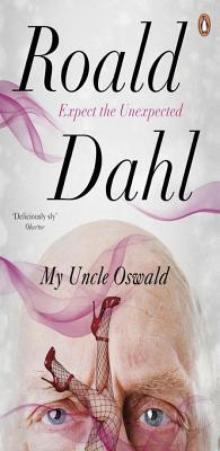 My Uncle Oswald
My Uncle Oswald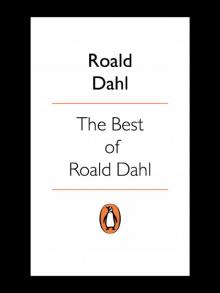 The Best of Roald Dahl
The Best of Roald Dahl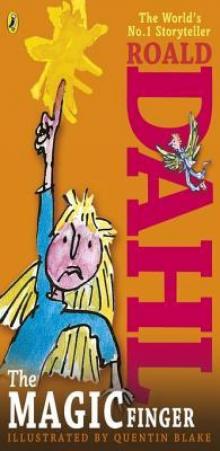 The Magic Finger
The Magic Finger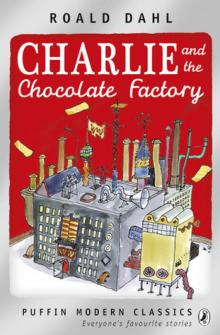 Charlie and the Chocolate Factory
Charlie and the Chocolate Factory Fantastic Mr Fox
Fantastic Mr Fox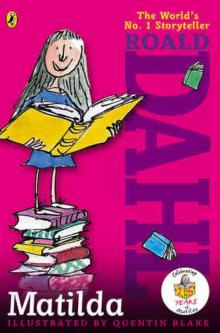 Matilda
Matilda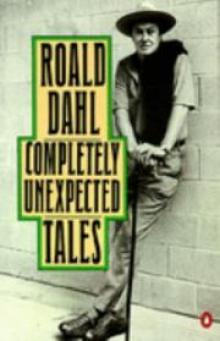 Completely Unexpected Tales: Tales of the Unexpected. More Tales of the Unexpected
Completely Unexpected Tales: Tales of the Unexpected. More Tales of the Unexpected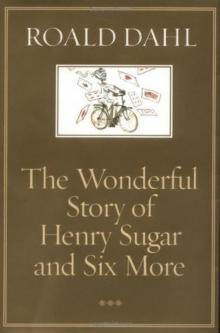 The Wonderful Story of Henry Sugar and Six More
The Wonderful Story of Henry Sugar and Six More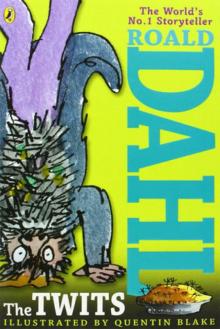 The Twits
The Twits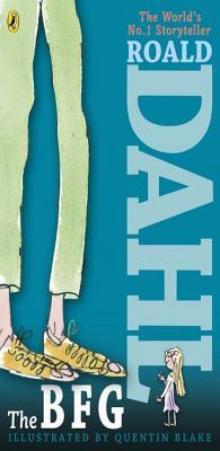 The BFG
The BFG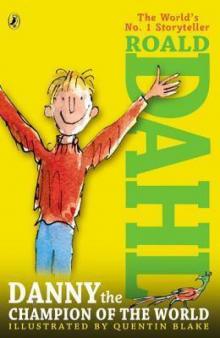 Danny the Champion of the World
Danny the Champion of the World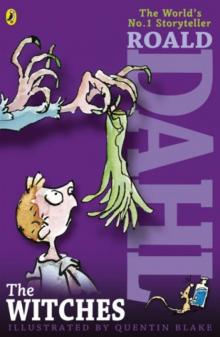 The Witches
The Witches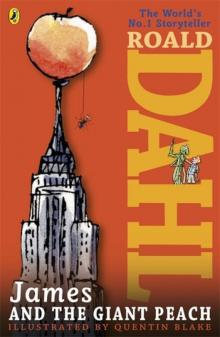 James and the Giant Peach
James and the Giant Peach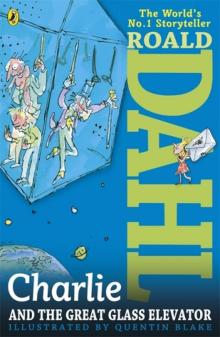 Charlie and the Great Glass Elevator
Charlie and the Great Glass Elevator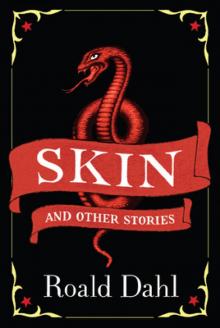 Skin and Other Stories
Skin and Other Stories Kiss Kiss
Kiss Kiss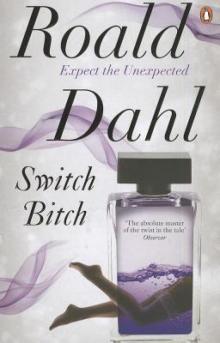 Switch Bitch
Switch Bitch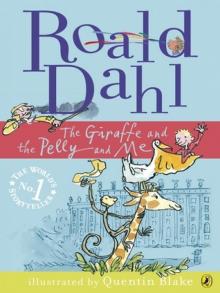 The Giraffe and the Pelly and Me
The Giraffe and the Pelly and Me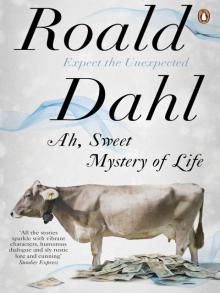 Ah, Sweet Mystery of Life
Ah, Sweet Mystery of Life Fear
Fear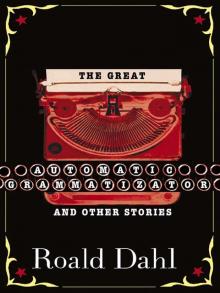 The Great Automatic Grammatizator and Other Stories
The Great Automatic Grammatizator and Other Stories Someone Like You
Someone Like You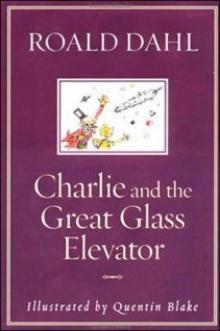 Charlie and the Great Glass Elevator c-2
Charlie and the Great Glass Elevator c-2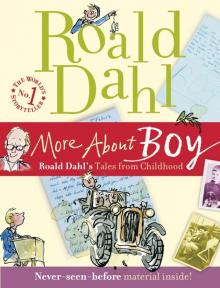 More About Boy
More About Boy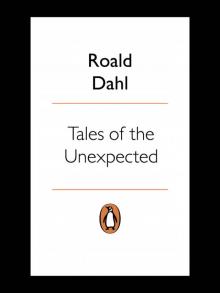 Tales of the Unexpected
Tales of the Unexpected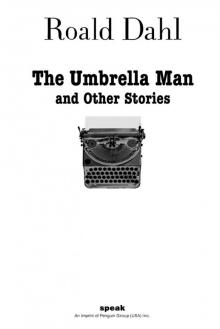 The Umbrella Man and Other Stories
The Umbrella Man and Other Stories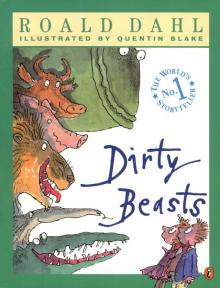 Dirty Beasts
Dirty Beasts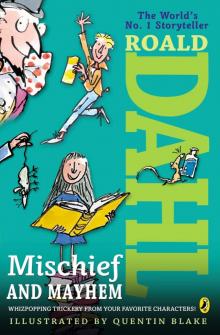 Roald Dahl's Mischief and Mayhem
Roald Dahl's Mischief and Mayhem The Collected Short Stories of Roald Dahl, Volume 1
The Collected Short Stories of Roald Dahl, Volume 1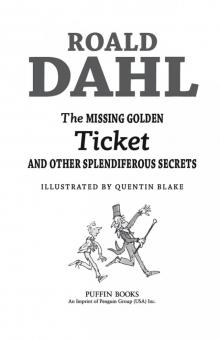 The Missing Golden Ticket and Other Splendiferous Secrets
The Missing Golden Ticket and Other Splendiferous Secrets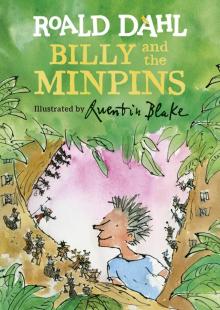 Billy and the Minpins
Billy and the Minpins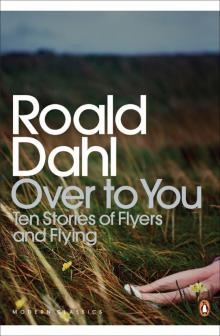 Over to You
Over to You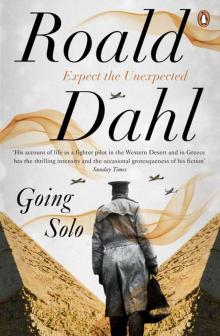 Going Solo
Going Solo Deception
Deception War
War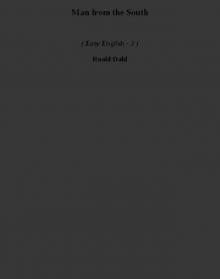 Man from the South ee-3
Man from the South ee-3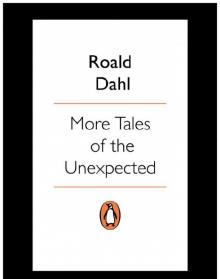 More Tales of the Unexpected
More Tales of the Unexpected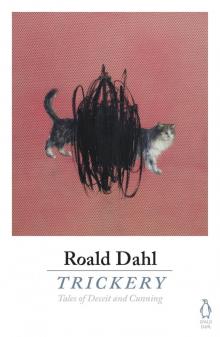 Trickery
Trickery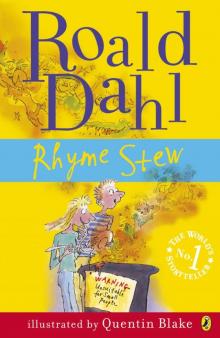 Rhyme Stew
Rhyme Stew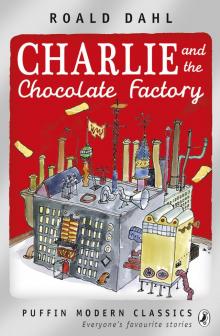 Charlie and the Chocolate Factory (Puffin Modern Classics relaunch)
Charlie and the Chocolate Factory (Puffin Modern Classics relaunch)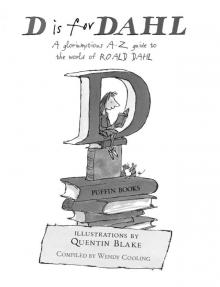 D is for Dahl
D is for Dahl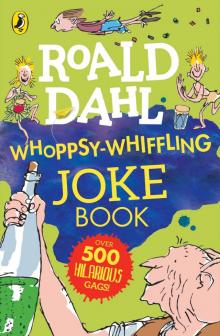 Roald Dahl Whoppsy-Whiffling Joke Book
Roald Dahl Whoppsy-Whiffling Joke Book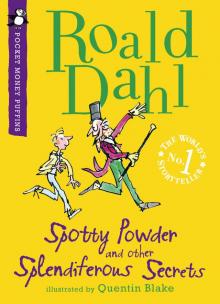 Spotty Powder and other Splendiferous Secrets
Spotty Powder and other Splendiferous Secrets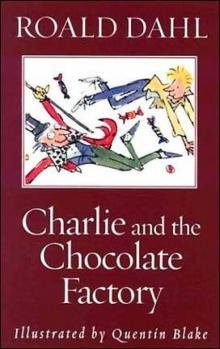 Charlie and the Chocolate Factory c-1
Charlie and the Chocolate Factory c-1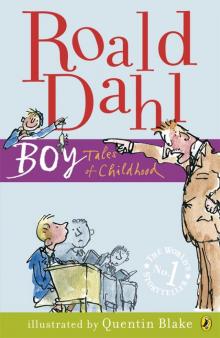 Boy
Boy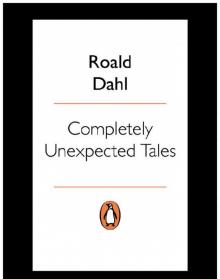 Completely Unexpected Tales
Completely Unexpected Tales Madness
Madness Innocence
Innocence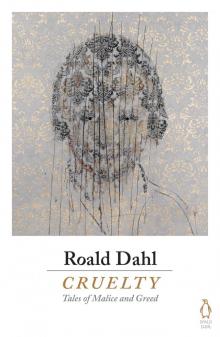 Cruelty
Cruelty George's Marvellous Medicine
George's Marvellous Medicine